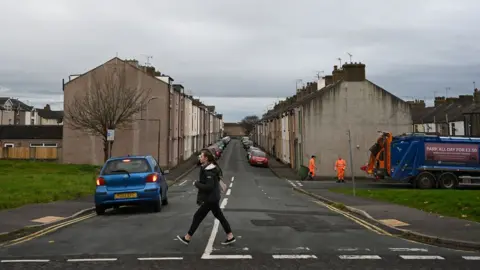PM's levelling up plan at risk of failure, warns ex-No 10 adviser

 Getty Images
Getty ImagesThe architect of Boris Johnson's initiative to revive so-called left-behind areas has warned that the "levelling up" scheme is at risk of failure.
Will Tanner, a former Tory No 10 adviser who was amongst the first to identify the "red wall" seats, calls on the government to abandon its "top-down" approach to the scheme.
In a new report for his Onward think tank, Mr Tanner also says the government should learn from the success of the last Labour government's New Deal for Communities which helped cut poverty in such communities.
Mr Tanner says: "The Treasury will not level up left behind places using the same top-down policies that left places behind in the first place.
"If ministers are serious about levelling up in the long term, they need to build local capacity that can endure - and help local people take back control of their communities."
Mr Tanner, a former adviser to Theresa May, has become an influential voice in Conservative circles after his Onward think tank identified the red wall seats in the run up to the last election.
They were the once rock-solid Labour seats which fell into Conservative hands at the 2019 general election.
In a report shortly before the election, Mr Tanner described "Workington Man" - from the West Cumbrian constituency - as the sort of lifelong Labour voter who would switch to the Conservatives.
This voter was pro-Brexit, sceptical of globalisation and wanted a government that would protect cherished local institutions such as pubs and post offices from closing.
In an interview with Newsnight ahead of the publication of his new report, Mr Tanner says: "Absolutely we came up with the Workington Man concept at the last election. We identified that as the archetypal voter that swung towards the Conservative party and delivered all those seats in the north of England - like Workington, like Walsall, like Warrington - those seats that the Conservative party had often never held before.
"It is precisely those seats that would benefit from a more localised approach, a bottom-up approach where communities take control of local assets like libraries and sports clubs and community hubs. Using them as the lynchpin for regeneration is likely to be successful in regenerating those local areas."
Newsnight visited Workington to gauge opinion about the government's "levelling up" agenda. Some shoppers thought the government was too focused on larger metropolitan areas.
But Mike Johnson, the Conservative leader of the local Allerdale Borough Council, did not recognise the criticisms in the report.
'Grassroots'
Mr Johnson told Newsnight: "We've certainly not encountered [too much central control] because a lot of the schemes we have put forward that have been successful bids have been community driven.
"For example we are looking at developing a sports village. That will involve a stadium for the local rugby team and the football team. That is driven by those two clubs. So it is sort of from grassroots up as opposed to it being imposed on them."
In his new report, Mr Tanner does praise the government for setting aside £1.4bn for the "levelling up fund".
But he calls on ministers to learn from Labour's £2.29bn New Deal Communities scheme which ran from 1998 to 2011. Of the 39 areas covered by the programme, 77% saw levels of deprivation fall relative to the national average between 2004 to 2019.
Dame Margaret Hodge, the former Labour minister, says the findings show it is wrong to say her party had neglected this area.
She told Newsnight: "Somehow this government thinks it invented a concern for and investment in communities that have gone through difficult times and may have high levels of deprivation. There have been policies to tackle this since I have been in politics."
Dame Margaret said that Labour had itself to blame for the belief among those in red wall seats that the party did not help those areas. Asked how Labour had lost the red wall seats even after investing in them she said: "That goes back to what happened with Labour after 2010 when we disowned all the successes we had achieved during 13 years in government."
Onward has examined government regeneration schemes over the last 60 years in the report: "Turnaround: How to regenerate Britain's less prosperous communities by helping them take back control".
